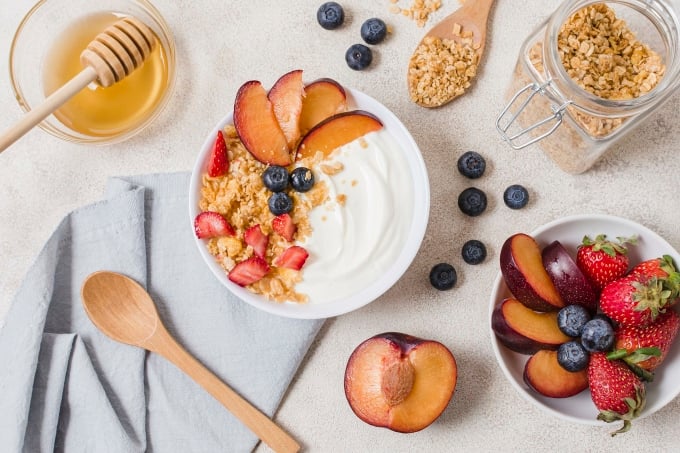Blueberries, bananas, watermelon, berries, mushrooms, green leafy vegetables, and fatty fish contain vitamins and antioxidants that help relieve headaches.
A scientific and reasonable diet can help patients reduce headaches. Master, Doctor Nguyen Anh Duy Tung, Nutrihome Nutrition Clinic System, said that to reduce the intensity and frequency of headaches, patients should eat foods rich in vitamins (vitamin D, group B...), minerals (magnesium, potassium...) and antioxidants.
Banana
This fruit contains a lot of potassium, magnesium and B vitamins that reduce headaches. Specifically, potassium and magnesium help strengthen the nervous system, repelling headache symptoms. B vitamins such as vitamin B1, B6, B9 act as supplements in the treatment and prevention of migraines.
Watermelon
Dehydration is one of the factors that cause headaches, especially migraines. Patients should focus on absorbing enough fluids to reduce the frequency and intensity of headaches.
92% of watermelon's weight is water. This fruit also provides magnesium, iron, fiber... which helps to repel other headache-causing factors such as anemia.
Herbal tea
Herbal teas relieve headaches and do not contain caffeine, so they do not cause insomnia. Ginger tea and chamomile tea have the ability to inhibit the release of prostaglandins - saturated acids that cause headaches. Peppermint tea helps reduce the symptoms of sinus headaches. Drinking 1-2 cups of herbal tea of any type every day can control the intensity of headaches and optimize the functioning of the nervous system.

Yogurt and berries are good for headaches. Photo: Freepik
Berries
Strawberries, raspberries, blueberries, and grapes contain high levels of antioxidants such as vitamin C, polyphenols, resveratrol, flavonoids, etc. These compounds have the ability to help fight free radicals that weaken the immune barrier in the nasal epithelium, promote the progression of chronic sinusitis, and cause headaches.
Mushroom
Mushrooms such as shiitake, button mushrooms, and king oyster mushrooms contain relatively high levels of vitamin B2. Absorbing about 400 mg of this nutrient every day can significantly improve the frequency and intensity of headaches, especially episodic migraines.
Yogurt
In many cases, stress from bowel problems, including constipation, can cause or aggravate migraines. In addition to brain-healthy foods, people with migraines should eat foods that are good for the digestive system, such as yogurt.
With a large amount of probiotics, yogurt helps balance intestinal microflora, supports digestion, and provides water for the body.
Green leafy vegetables
Green leafy vegetables such as spinach and Swiss chard are rich in magnesium and sulphoraphane - a powerful anti-inflammatory. Thanks to the effects of these two nutrients, the above vegetables have the ability to relieve pain caused by cerebral ischemia, contributing to controlling headaches caused by chronic sinusitis.
Broccoli
A decrease in hormones, especially estrogen, in the body can lead to migraines in premenopausal women. Adding broccoli to your diet can alleviate this condition. The phytoestrogen compound in broccoli has a similar function to estrogen, helping to improve symptoms caused by estrogen deficiency.
Fatty fish
Omega-3 in fatty fish such as tuna, salmon, and mackerel is a natural anti-inflammatory, reducing inflammation and reducing headaches caused by inflammation, especially upper respiratory tract infections.
These fish also contain vitamin B2 - a nutrient that can improve migraines by increasing energy metabolism to nerve cells, helping to stabilize the nervous system.
Whole grains
Refined carbohydrates can increase blood sugar - one of the factors that lead to headaches. Instead of consuming refined carbohydrates such as white rice, white noodles, patients should prioritize complex carbohydrates from whole grains such as barley, brown rice... This food group contains lower sugar content, many nutrients that are beneficial for the nervous system such as magnesium, potassium.
Sweet potato
Sweet potatoes are rich in magnesium and vitamin B6, two nutrients that help improve blood circulation. Eating this food regularly can relieve headaches, especially in people with cerebral anemia, insomnia, and prolonged stress.
Doctor Duy Tung recommends that people with headaches should drink about two liters of water per day to maintain adequate water levels in the body, reducing fatigue and headaches due to dehydration. Supplementing active ingredients from blueberries and ginkgo biloba helps regulate blood flow to the brain, increase nutrients to the brain, improve headaches, insomnia and cerebral anemia.
Patients should control stress by practicing yoga, jogging, meditating, sleeping about 7-8 hours a day, not too late. Patients should go to a neurologist for examination and treatment as prescribed by the doctor.
Kim Thanh
| Readers ask questions about nutrition here for doctors to answer |
Source link






































































































Comment (0)